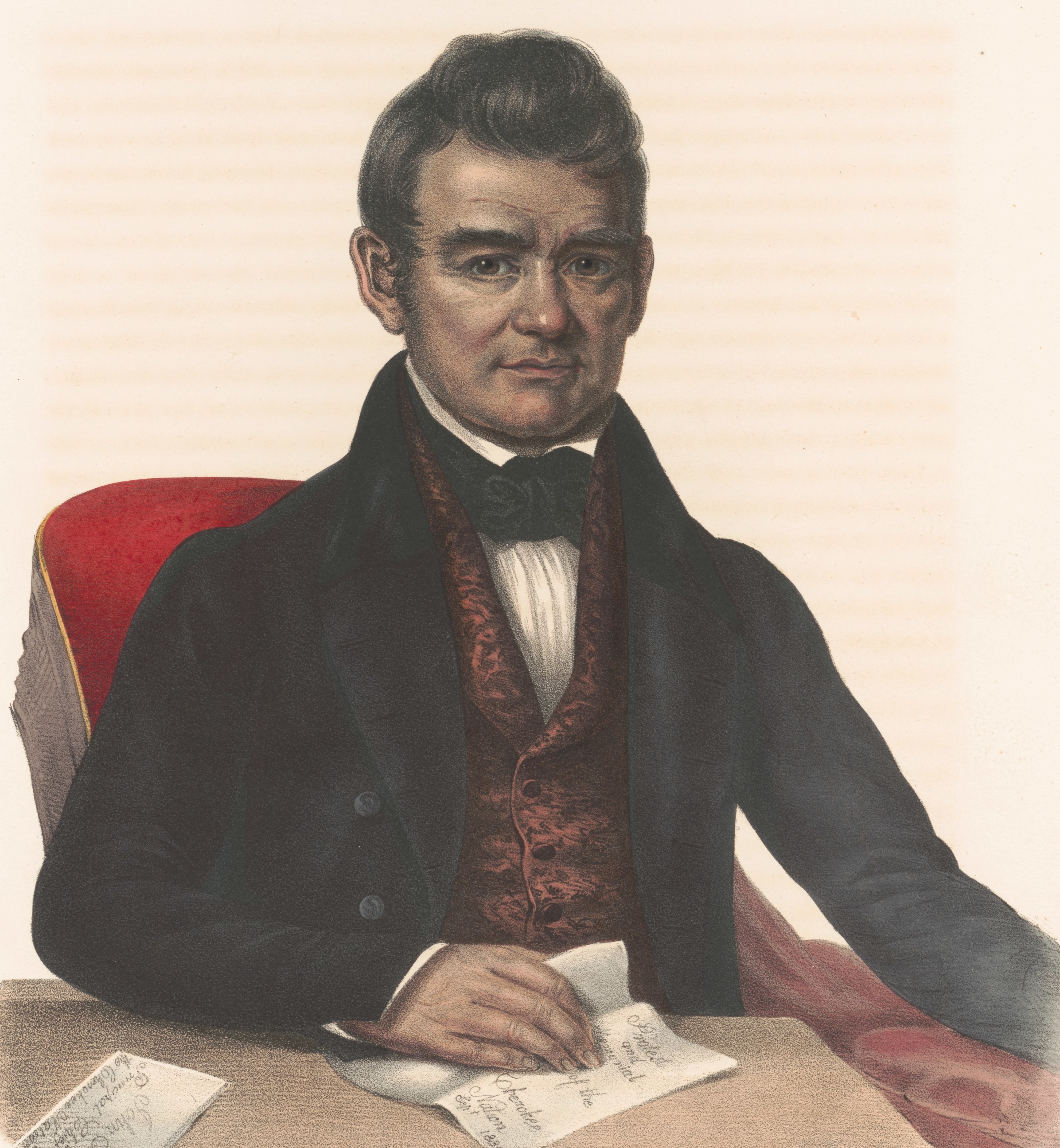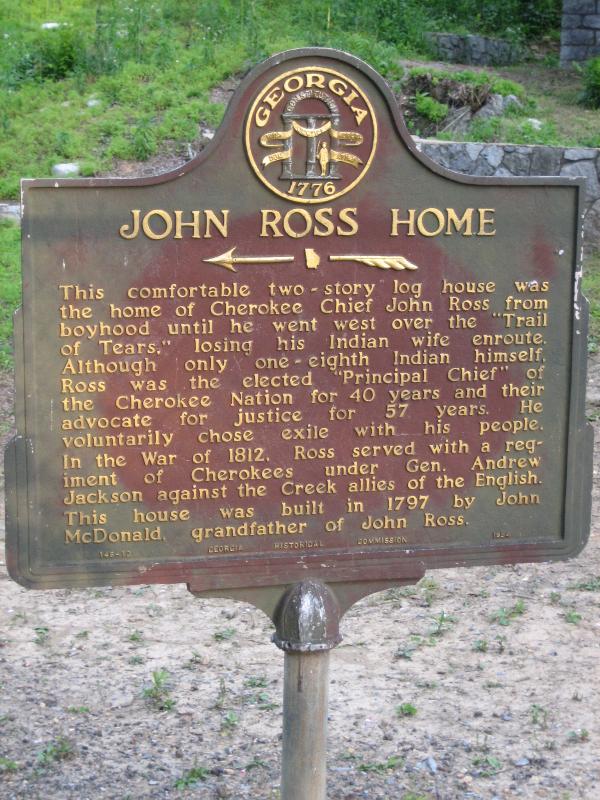John Ross
Chief John Ross was a Celtic-Indian that was three fourths Scots-Irish (Celtic-pronounced Kel' Tic'), one eighth English (Anglo), and one eighth Cherokee (American Indian). He served as Principal Chief of the Cherokee Nation for 38 years from 1828 through 1866. He was born at Chief Little Turkey's Town or Turkey Town near present day Gadsden, Alabama on October 3, 1790 and died on August 1, 1866. He was named after his Scots-Irish grandfather John McDonald. His grandmother was Ann Shorey who was half English and half Cherokee and was the daughter of an Englishman William Shorey. Ann also had a brother Will Shorey who was also half Cherokee and half English.


John Ross
Scot-Irish trader John McDonald's primary home in the Cherokee Nation was close to Chickamauga Creek south of the Tennessee River just southwest of Chattanooga, Tennessee where the Brainerd Mission was later located. The British began to use the Chickamauga Town as a headquarters for their operations in the Southwest, stockpiling food and supplies there and using the area as a rallying point for all tribes of the Chickamauga Confederacy that were hostile to the Americans. It is from this location during the Revolutionary War era from 1776 to his death on March 1, 1792, that the fierce Chickamauga Chief Dragging Canoe was supplied with British weapons, powder, lead, and suppiles to make war against the Americans…the Cherokees were seen as a barely containable force that could help tip the balance of power in early America one way or the other, and McDonald was seen as a possible fulcrum-for-hire, right at the center (Bishop, 2010).
But all of this came to an abrupt end in April 1779, when General Evan Shelby led an American attack against Chickamauga Town and the surrounding villages. The army burned all the buildings and destroyed the commissaries of McDonald and the other British agents, laying waste to the stores of food and plundering everything that could be carted off for sale, such as ammunition, furs, and horses (Brown, 1938). The sale of the British items taken from McDonald's place is where Sale Creek gets its name.
“I … enclose you a letter from Colonel Shelby stating the effect of his success against the seceding Cherokees and Chuccomogga,” Thomas Jefferson (1779) reported to George Washington following the attack. “The damage done them was … burning 11 towns, 20,000 bushels of corn collected probably to forward the expeditions … and taking as many goods as sold for $125,000”.
The Chickamauga warriors were not present during the attack on McDonald's place. When they returned to see the destruction around Chickamauga Creek, Dragging Canoe decided to relocate again, even farther from the American army, west of Lookout Mountain, forming what would become known as the “Five Lower Towns” of Nickajack, Running Water, Long Island Town, Crow Town, and Stecoe, or “Lookout Mountain Town”. Doublehead, who controlled the Great Bend towns, had already moved to the Muscle Shoals and established Doublehead's Town at the head of Elk River Shoals in present-day Lawrence County, Alabama.
Though the Americans had officially declared the Revolution over on April 11, 1783, the Chickamauga Confederacy fought on from their new base at the Five Lower Towns and from Doublehead's stronghold at the Muscle Shoals. By 1784, John McDonald was back in business and returned to help the Chickamauga forces by providing British war supplies. He set up shop at Running Water, a town situated at a creek crossing on the Tennessee River, just west of Lookout Mountain. McDonald with the help of British agents were supplying arms to several Chickamauga leaders and others living around Running Water and the lower towns, but he was still were within twenty miles of his original home of Chicamoggy (Chickamauga Creek). The British agent Alexander Cameron was living at McDonald's and supplying goods and ammunition from Savannah or Augusta. Cameron in the course of the war was a murderer and robber, and frequently went out with the Chickamauga Indians on raids against the settlers.
In 1785 John McDonald ransomed the life of a young Scots-Irish man by the name of Daniel Ross that was a captive of Bloody Fellow. Since McDonald’s mother was Barbara Ross, he may have saved Daniel Ross because of their kinship or they may have been cousins. Daniel Ross became McDonald’s business partner and ran a trading post at Stecoe or Lookout Mountain Town. Later Daniel Ross would marry McDonald’s daughter Mollie and become the father John Ross.


About 1788, John McDonald and Daniel Ross were feeling the pressure of war and moved their trading posts together with their families to Turkey Town in Alabama, and continued living among and supplying the Chickamauga Confederacy. Little Turkey was the Principal Chief of the Cherokee Nation and resided in his town near the Coosa River. Little Turkey's Town was also much closer to the old abandoned French Ft. Tolouse, and there was talk being circulated that it might be re-garrisoned by the Spanish or that a new fort would be garrisoned just north, near the current site of Ft. Payne, Alabama.
It was at Turkey Town, near the present location of Center, Alabama on the Coosa River, where John Ross was born to Daniel Ross and Mollie McDonald on October 3, 1790; therefore, John Ross was born during the Chickamauga War and was a Chickamaugan by birth. During his boyhood, he lived among the Chickamauga people who had fought fiercely to keep their homelands. John Ross grew up in the aftermath of the Chickamauga War and became principal chief of the Cherokee Nation during the removal period. Ross would fight just as fiercely as the Chickamaugans to keep the lands of their Cherokee ancestors.

At the time of John Ross' birth his grandfather, John McDonald was corresponding with William Panton of Panton, Leslie and Company, a British supplier of trade goods that had become allied with the Spanish interests. By 1800 through peace treaty agreements with the United States and Cherokees, John McDonald got to move back to his original Chickamauga home some 15 miles south of the Tennessee River near present-day Chattanooga, Tennessee. It was not until turning his home place at Chickamauga over for the establishment of the Brainerd Mission in 1817 that McDonald finally retired to the newly constructed home of his grandson, John Ross.


John Ross Home Historical Marker, Rossville,GA
At the time of John Ross' birth his grandfather, John McDonald was corresponding with William Panton of Panton, Leslie and Company, a British supplier of trade goods that had become allied with the Spanish interests. By 1800 through peace treaty agreements with the United States and Cherokees, John McDonald got to move back to his original Chickamauga home some 15 miles south of the Tennessee River near present-day Chattanooga, Tennessee. It was not until turning his home place at Chickamauga over for the establishment of the Brainerd Mission in 1817 that McDonald finally retired to the newly constructed home of his grandson, John Ross.

John Ross Home near Chattanooga, Tennessee
The John Ross faction, who fought removal against the wishes of the Ridge/Watie faction that signed the Treaty of New Echota, was friends of Doublehead’s relatives who were already in the west. During the Trail of Tears, Quatie, John Ross's full Cherokee wife, died on the trail along with some 4,000 Cherokees before reaching Indian Territory. Doublehead’s assassination and other factors culminated in a blood bath when both factions came together in the west. Doublehead's son Bird Tail Doublehead and his close relatives killed Major Ridge when Ridge got to the west. The Ross faction was probably responsible for some 70 deaths when the Cherokees got to the west as revenge of Doublehead's murder by Ridge and for the Ridge Party signing the Treaty of New Echota which sealed the removal of Cherokee people.


Major Ridge
Butch, Thanks so much for providing this excellent research for others. Anyone teaching would great benefit from your work. Angela
ReplyDelete